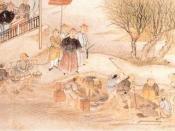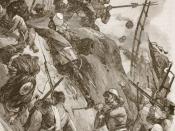As the western world is quickly stepping into the industrial age during the 17th and 18th century, the Far East civilizations have still remained in a mostly feudal society. This unbalance of progress created an unbalance of world perspective, unbalance of trade and unbalance of military power. The result of this unbalance made India a colony of Britain, also completely changed the face of Southeast Asia and awakened Japan to become a world power. This unbalance, however, is most evident in the two Opium Wars that took place in China during the middle of 19th century and early 20th century. The Opium Wars were interestingly enough, not really about opium. The cause of the war maybe partly due to opium trade, but in the end the war became something much larger. The British-Chinese armed conflict would have occurred even if there was no opium trade at all. The Opium Wars are really about Britain's huge economical problems, British trader's financial interests and Britain wanting exclusive rights in China.
Also it is a clash of two civilizations that are in two different eras. The Qing government and Chinese people in general were not aware of any internationally accepted standards and behaviors. Their negligence of the international scene and the total lack of communication with foreign governments led to the inevitable misunderstanding and clash with western powers. The ramifications and influences of the Opium Wars on the Chinese civilizations are still evident even today, in the form of the Chinese people's general distrust of the West, extreme nationalism and the obsession of preserving absolute unity of the country.
The first Opium War occurred in the year 1840.(Beeching, 37) The Qing government was made aware of the dangers of opium smoking among the Chinese people and banned opium in 1821.(Beeching, 38) But the...



A "B" Paper - this paper needs work
This paper is pretty good, but its not backed up by fact, there is a lot of personal opinions in it. I would like to see more proof in the paper to back up the personal thoughts about the war. How did you come up with those conclusions?
1 out of 1 people found this comment useful.